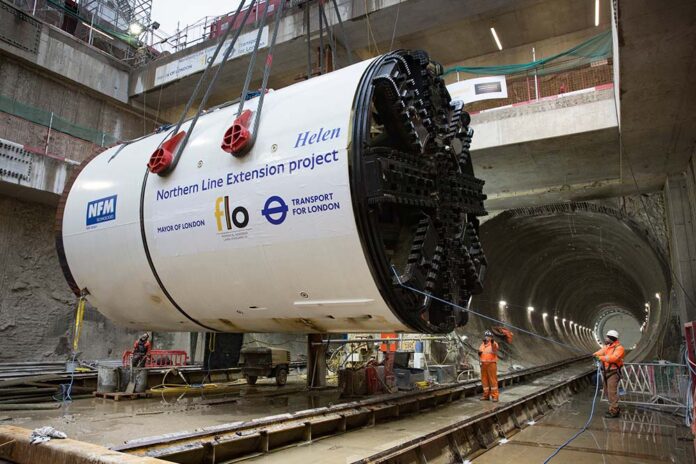The Railway Industry Association (RIA) has outlined positive lessons in how best to work with the UK supply chain ahead of the Integrated Rail Plan being outlined by government this week.
Key lessons on good project delivery include developing strategic partnerships with contractors and clients, as well as aligning all parties with shared goals and creating incentive for positive behaviours. The RIA also says pipelines should be properly shared and supplemented by long-term investment to drive competition. Innovation should be supported, it says, procurement should happen early, and the diversity of the supply chain and its people fully appreciated.
To draft the report, RIA examined delivery of the Northern Line Extension, the reopening of the Northumberland line, the East Coast Mainline’s power supply upgrade and the procurement of the London Underground’s Bank Station Capacity Upgrade.
Chief executive of RIA, Darren Caplan, said: “Major rail projects are complex and sometimes make headlines for all the wrong reasons. So we are today launching the RIA ‘Major Rail Projects’ report, to highlight some of the many successful schemes we don’t always hear about, and the many positive lessons we can learn from them to inform future work and support rail exports going forward. With the Integrated Rail Plan due out shortly, it is now more important than ever to set out the significant value railway projects bring to the country.
“Whether related to track or train, the UK supply chain has shown fantastic capability to deliver major rail projects. We believe this report can play a key role in helping the supply sector build infrastructure and rolling stock which really is fit for the future, whilst also representing good value for the taxpayer. We hope all who read and make use of it find it a useful contribution as we work to build world-class rail in the UK in the months and years ahead.”
Managing director at the West Coast Partnership Development, Caroline Donaldson, said: “The Government is making very significant investments in rail infrastructure, including in High Speed Two. West Coast Partnership is working closely with industry and Government to make the most of this investment in high speed rail for the benefit of customers and communities. Understanding the key enablers to successful delivery of major projects is essential to unlock the full potential of rail to support a more productive, healthier and greener economy.”
Head of business development of UK rail at Bechtel, Ceri Evans, said: “The real skill of collaboration isn’t paying lip service because you “have” to do it or because of a contract. Instead, truly collaborative teams have to all go on a journey together, with transparency and trust at the core, utilising the contract fully while leveraging relationships and communication to drive progress and change in a positive way. The outcomes I have experienced with this approach prove to me time and again why it’s so important for authentic collaboration to be at the heart of successful major projects.”
Managing director of transportation at Costain, Sue Kershaw, said: “A progressive approach to procurement is vital to facilitate the significant economic, social and environmental value which investment in infrastructure can bring. Procurement needs to be agile, and fundamental to this approach is trust; only by working together across our industry can we ensure that procurement is fit for the future.”
Business growth director at Trough-Tec Systems, Lucy Prior MBE, said: “I’m delighted to see this report not only addressing the huge complexity of major projects, but acknowledging the fact that supply chain, from the top tiers right down through the sub-suppliers, can and does enable massive process improvements.
“In particular, it’s reassuring to see so many case examples from the SME community: as an industry we often say they bring an ability and knowledge that tier ones need to embrace. These case studies actually demonstrate just how important SMEs are in the successful delivery of major projects, and prove that the earlier they are brought in, the quicker and better the results are. That there are so many examples of success within this report is something to be proud of.”
Image supplied by RIA







































 0113 2082620
0113 2082620 info@railbusinessdaily.com
info@railbusinessdaily.com 15 Mariner Court, Wakefield WF4 3FL
15 Mariner Court, Wakefield WF4 3FL

